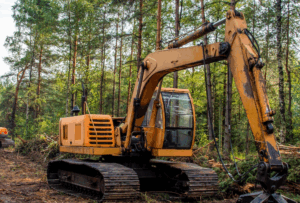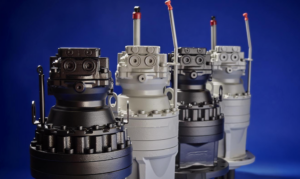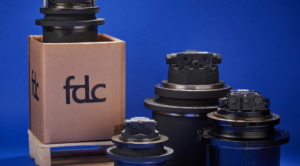By The Final Drive Centre
As experienced operators and maintenance professionals know, summer conditions present significant operational challenges.
Elevated ambient temperatures, increased airborne particulates, and thermal cycling place additional stress on key components, especially swing drives. These assemblies are critical for machine rotation and stability, and when compromised, they can quickly cause costly downtime.
Thermal Load on Hydraulic Systems and Drive Units
1. Overheating Risks in Hydraulic-Powered Drives
Swing drives in excavators and similar plant machinery rely on hydraulic input — often via a dedicated or shared circuit — to manage slewing torque and rotation speed. High ambient temperatures increase hydraulic oil temperatures, which in turn:
- Reduces volumetric efficiency in swing motors
- Accelerates internal leakage across seals and spool valves
- Increases the likelihood of cavitation under transient high-load conditions
This is particularly critical in systems where the swing function is not independently cooled or isolated from the main hydraulic circuit.

2. Compromised Cooling System Performance
Radiator and oil cooler efficiency is reduced when airflow is obstructed by dust or if fins become clogged — common in dry, dusty environments. Additionally, when hydraulic reservoirs are undersized relative to cycle demands, thermal buildup cannot dissipate quickly, compounding the issue.
Recommendation: Validate hydraulic oil cooling capacity against expected duty cycles and ambient conditions. Consider installing supplemental cooling fans or heat exchangers where applicable.
Lubrication Degradation and Gear Set Integrity
1. Viscosity Drop and Load-Carrying Limitations
In planetary swing drives, high temperatures cause lubricants (often EP-rated gear oils or proprietary blends) to thin. When viscosity falls below the design spec for load-bearing gear sets:
- Boundary lubrication breaks down
- Micropitting and surface fatigue accelerate, especially under oscillating loads
- Gear tooth backlash may increase due to thermal expansion of housings and shafts
2. Oxidation and Additive Depletion
Thermal stress increases oxidation rates in swing drive oils, breaking down anti-wear and extreme pressure (EP) additives. This chemical degradation is particularly problematic in enclosed planetary units where oil change intervals are extended or not closely monitored.
Recommendation: Use condition-based monitoring (CBM) methods such as regular oil sampling and spectral analysis to determine actual lubricant health rather than relying on hour-based intervals alone.

Material Fatigue and Mechanical Stress
1. Expansion Cycles in Rotational Bearings and Housings
Slew rings and swing drive housings undergo continual expansion/contraction as they heat during operation and cool during idle periods. This cyclical stress can:
- Loosen torque settings on swing drive mounting bolts
- Affect pre-load on tapered roller bearings or cross-roller slewing rings
- Cause distortion in machined sealing faces, leading to leak paths
2. Premature Failure of Shaft Seals
Lip seals and face seals used in swing drive housings are especially vulnerable to thermal cycling. Seal material hardening or deformation can lead to:
- Ingress of particulates or water
- Loss of lubrication
- Secondary damage to gear sets or planetary carriers
Recommendation: Inspect seal condition closely in pre-summer servicing. Consider upgrading to high-temp-rated sealing materials (e.g., Viton, PTFE) where applicable.
Contaminant Ingress in Dust-Prone Environments
1. Dry Conditions = Higher Particle Load
Summer operation often takes place on hard, dry surfaces, where airborne dust increases significantly. Fine particles can bypass compromised breathers or seals and contaminate swing drive oil — leading to abrasive wear, even in closed-loop units.
2. Breather and Filter Oversights
Many planetary swing drives use pressure-relief breathers that are easily overlooked. If these become blocked, internal pressure may rise during operation, forcing contaminants past seals or causing oil leaks.
Recommendation: Inspect or replace breathers regularly and ensure swing drive casing pressures remain neutral during temperature changes.
Operator Impact: Control Sensitivity and Cabin Efficiency
Even experienced operators can experience reduced efficiency when cabin environments are hot or poorly ventilated. Heat-induced fatigue leads to slower response times and increased error rates — particularly during fine control operations such as trenching or grading.
Ergonomics Tip: Ensure swing control response is consistent — unexpected lag due to hydraulic fade or thermal pressure changes in pilot lines should be diagnosed early.

Proactive Solutions and Upgrades
✔ Use Synthetic Lubricants Where Possible
High-performance synthetics maintain viscosity and resist oxidation more effectively under high heat, especially in continuous swing operations or high-load applications.
✔ Upgrade Cooling Capacity
Evaluate whether current hydraulic cooling is adequate for summer workloads. Retrofitting an auxiliary cooler or upsizing the reservoir may reduce system strain.
✔ Replace Worn Swing Units Proactively
Rebuilding or replacing a marginal swing drive before peak season prevents unplanned failures and costly delays.
✔ Monitor and Sample Regularly
Implement scheduled oil analysis and component monitoring — especially for high-utilisation machines. Early detection is significantly cheaper than reactive repair.
Don’t Let Summer Downtime Swing You Off Course
Swing drives are high-torque, high-load components that work hard in every season — but summer presents distinct risks that demand attention. At The Final Drive Centre, we specialise in supplying, refurbishing, and advising on swing drives for all major makes and models. Whether you’re running Hitachi, Komatsu, Volvo, or Doosan, our team understands the technical detail behind your machine’s slewing system.
Need expert advice or a quote on a replacement swing drive?
Get in touch with The Final Drive Centre — we’re ready to support your fleet through the toughest conditions.







